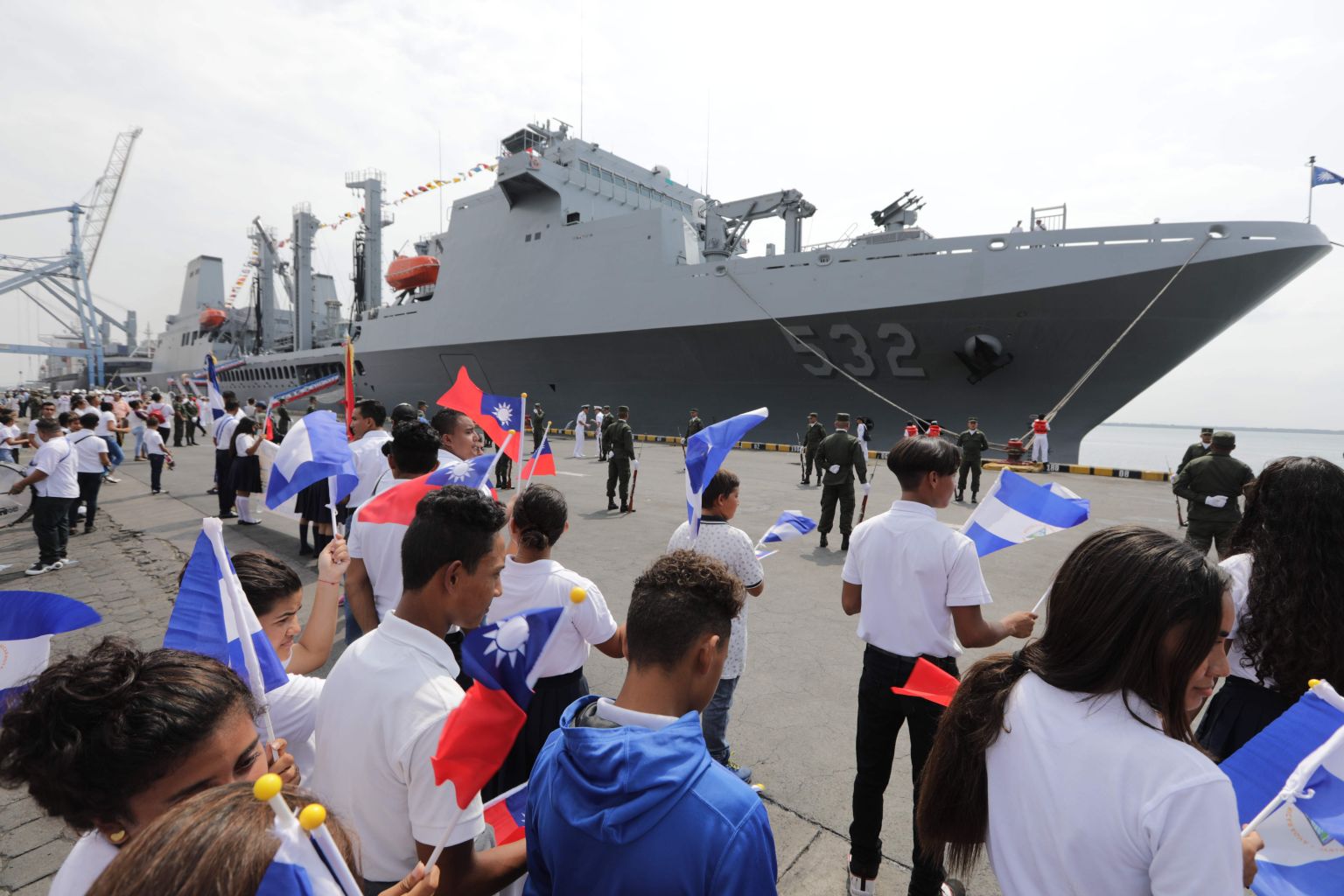China demands halt of US arms sales to Taiwan, as island stresses Central America ties with navy visit
Sign up now: Get insights on Asia's fast-moving developments

Nicaraguan students wave Taiwanese flags to welcome three Taiwanese Navy warships at Corinto port, some 149km north-west of Managua, on April 9, 2018.
PHOTO: AFP
Follow topic:
BEIJING/CORINTO, NICARAGUA (REUTERS, AFP) - China said on Monday (Apr 9) that it opposed the United States selling weapons to Taiwan, after the Trump administration approved the marketing licence required for American manufacturers to sell technology to Taiwan that would allow for building submarines.
Taiwan's Central News Agency said on Saturday that Taiwan's Ministry of National Defence confirmed that the US Department of State had agreed to grant the licence needed to sell the technology to Taiwan so the self-ruled island could build its own submarines.
China's Defence Ministry, responding to a journalist's question in an online statement about the issue, demanded that the US "halt all forms of military links between the United States and Taiwan, as well as all forms of weapon sales to Taiwan".
"China's military has the ability and determination to defeat all attempts to separate our country, and will adopt all necessary measures to resolutely defend national sovereignty, security and territorial integrity," ministry spokesman Wu Qian said. He did not elaborate.
Taiwan is one of China's most sensitive issues. The island is claimed by Beijing as its sacred territory, part of "one China", and Beijing has never renounced the use of force to bring under Chinese control what it considers to be a wayward province.
The US State Department over the weekend declined to confirm the details of the Taiwan news report.
A State Department official had said the agency continued to review Taiwan's defence needs and referred questions about specific procurement plans to Taiwanese authorities.
China's hostility to Taiwan has grown since Ms Tsai Ing-wen from the pro-independence Democratic Progressive Party was elected president in 2016. China fears she wants to push for formal independence, though Ms Tsai says she wants to maintain the status quo and is committed to peace.
NAVY FLOTILLA
The opposition from China came as a Taiwanese navy flotilla docked in Nicaragua, in a high-profile visit highlighting ties with Central America and the Caribbean that are shrinking as China presses countries in the region to drop diplomatic relations.
The three vessels - described as being on a training mission - powered into Corinto, a port town on Nicaragua's Pacific coast, in a visit "to strengthen the ties of friendship", Nicaraguan officials and Taiwanese diplomats said.
Some of the 800 crew members who disembarked put on a Taekwondo martial arts display after an inspection by Nicaraguan military brass.
The warships were Pan Shi, a modern and sleek Fast Combat Support Ship, Pan Chao, an older, US-designed frigate, and Kuen Wing, a more recent, French-made stealth frigate.
They were to stay in port for three days, with the crew of officers, sailors and cadets participating with the Nicaraguan military in joint training activities, the Taiwanese embassy said.
It was the sixth time Taiwan has sent a "friendship flotilla" to Nicaragua.
After Nicaragua, Taiwan's navy ships were to go on to make stops in the Marshall Islands, El Salvador, Honduras, Guatemala and the Dominican Republic.
ASSERTIVE CHINA
Taiwan is gradually running out of ports of call as China - which considers Taiwan a renegade province that will one day be brought back under Beijing's control - presses countries to drop relations with Taipei.
Half the countries with which Taiwan has bilateral diplomatic relations are in Latin America and the Caribbean. And it is slowly losing ground there.
In June last year, Panama cut ties with Taiwan to open relations with China instead. Costa Rica did likewise in 2007.
The parts of Latin America that still have ties with Taiwan are the Central American countries of Belize, El Salvador, Guatemala, Honduras and Nicaragua; the Caribbean states of Haiti, St Kitts and Nevis, St Vincent and the Grenadines, the Dominican Republic, and Santa Lucia; and the South American nation of Paraguay.
Across the region, China's increased investment and a more assertive foreign policy are being felt both economically and politically.
That trend has unsettled the US, which views the Chinese interest as encroachment in a region that it once regarded as its backyard.
US President Donald Trump is to attend a summit of leaders across the Americas in Peru on Friday and Saturday.
White House officials said part of his focus would be on pushing back against "external economic aggression", taken to mean China's growing investment in the region.

